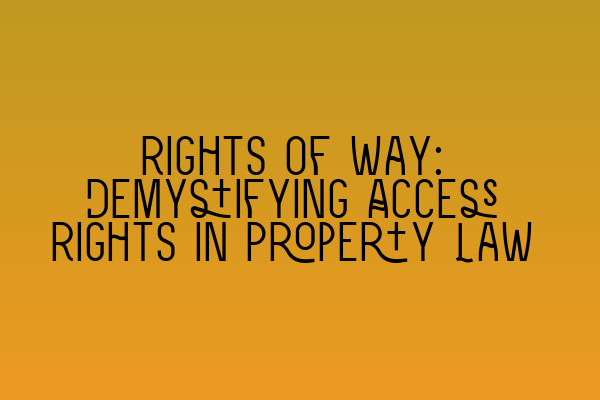As a solicitor specializing in property law, I often come across questions about rights of way and access rights. It’s a topic that can be quite confusing for many people, especially when it comes to understanding their rights and responsibilities. In this blog post, I aim to demystify access rights in property law and provide you with a clear understanding of what rights of way entail.
What are Rights of Way?
Rights of way are legal rights that allow individuals to pass through or use someone else’s property for a specific purpose. These rights can be granted in various circumstances and can exist over both private and public land.
There are generally two types of rights of way: public rights of way and private rights of way.
1. Public Rights of Way
Public rights of way are typically established by law and provide the general public with the right to pass and repass along specific routes. These routes can include footpaths, bridleways, and byways. Public rights of way are often marked by signs or indicated on official maps.
It’s important to note that public rights of way can vary in terms of their permitted uses. For example, some footpaths may only allow pedestrian access, while bridleways may allow both pedestrians and horse riders. Additionally, byways are open to motor vehicles as well.
If you’re unsure about the existence or location of a public right of way, it’s advisable to consult an experienced property solicitor who can provide guidance and assistance.
2. Private Rights of Way
Private rights of way, on the other hand, are specific rights granted to individuals or entities that allow them access to a specific property or piece of land. These rights are typically documented in legal agreements, such as deeds or contracts, and can only be exercised by the individuals or entities specified in the agreement.
Private rights of way can be created in various ways, such as through a legal easement or by virtue of long use (known as a prescriptive right of way). It’s crucial to establish the legal basis of a private right of way to ensure that your access rights are protected.
When dealing with private rights of way, it’s essential to understand any limitations or conditions that may be attached to the right. For example, the right may be limited to certain hours of the day or specific types of access (e.g., pedestrian-only).
If you’re considering purchasing a property that involves a private right of way, it’s advisable to conduct a thorough due diligence process and seek professional legal advice to ensure that you fully understand the implications and obligations associated with the right.
Importance of Understanding Access Rights
Understanding your rights of way and access rights is crucial for several reasons:
1. Proper Use and Enjoyment of Property
Ensuring that you have adequate access to your property is essential for its proper use and enjoyment. Whether you need access for residential, commercial, or agricultural purposes, knowing your access rights allows you to plan effectively and avoid any unnecessary disputes or complications.
2. Legal Compliance
By understanding your rights and responsibilities when it comes to accessing and using someone else’s property, you can ensure that you comply with relevant laws and regulations. This can help you avoid costly legal disputes and potential penalties.
3. Property Value
Access rights can have an impact on the value of a property. If there are restrictions or limitations on access, it may affect the desirability and marketability of the property. Conversely, properties with well-established and unrestricted access rights may be more valuable and attractive to potential buyers.
Conclusion
Understanding rights of way and access rights in property law is essential for anyone involved in property transactions or seeking to protect their access rights. Whether you’re dealing with public rights of way or private rights of way, it’s crucial to seek professional legal advice to ensure that your rights are properly established and protected.
If you have any questions about rights of way or need assistance with property law matters, don’t hesitate to contact SQE Property Law & Land Law. Our experienced team of solicitors can provide expert guidance and support to help you navigate the complexities of access rights in property law.
Related Articles:
